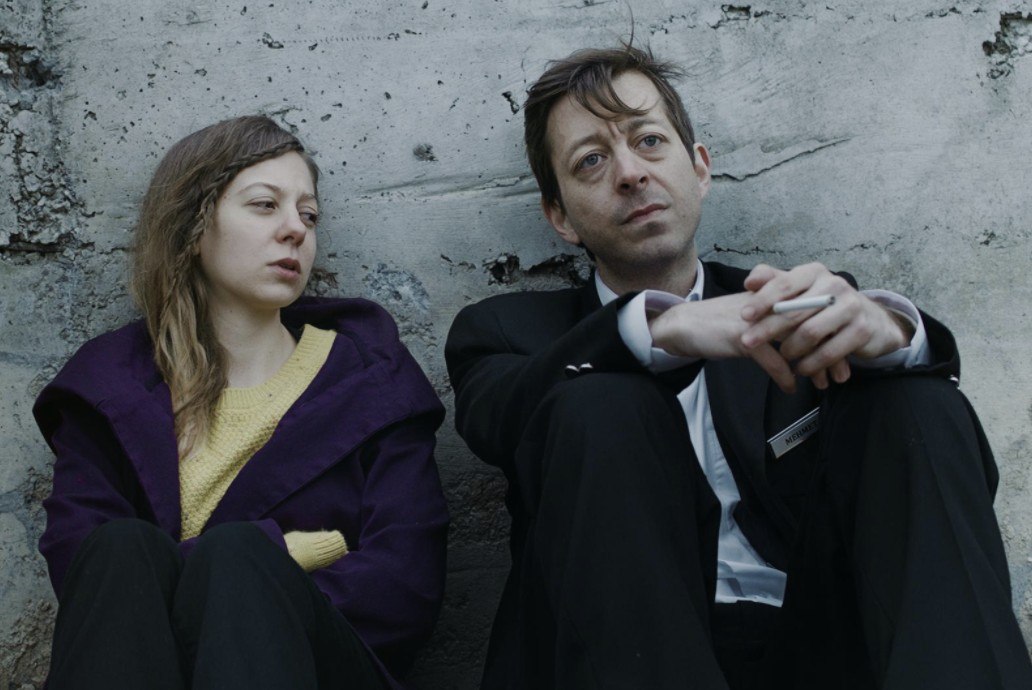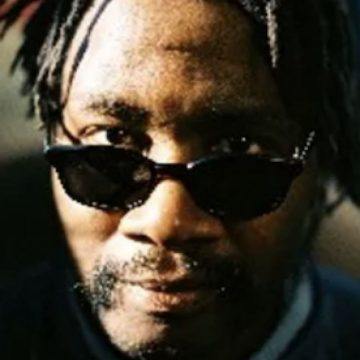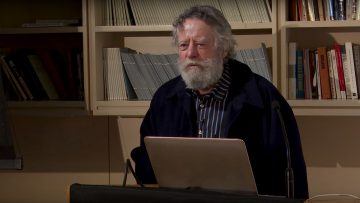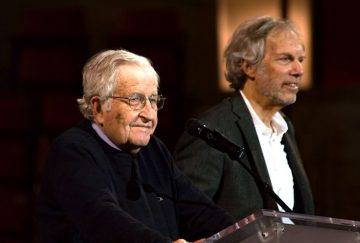by Brooks Riley

by Brooks Riley

by Alexander C. Kafka

What do you get when you combine unrelenting nihilism with art-school swagger? The Antenna, the first feature film of Turkish writer-director Orçun Behram, a 2011 graduate of Columbia College Chicago who until now has worked on music videos, short films, and documentaries.
Ihsan Önal plays a heavy lidded, bug-eyed building superintendent named Mehmet. A dour insomniac prone to work-shift napping, he looks like Paul McCartney fused with Peter Lorre and Mr. Bean. Mehmet oversees, or rather undersees from a ground-floor observation booth, a towering apartment building on a windy tundra during an unspecified but late 70s/early 80s looking era. Mehmet is resigned to a pitiful life — “One also gets used to rotting,” he says to his teenage confidante, Yasemin (Gül Arici). He gives her a ticket to escape, though. In a stultified world, she has a wall of Post-it notes and push pins with strings attached — ideas, we deduce, that could take her places.
Mehmet’s bully of a boss, Cihan (Levent Ünsal), informs him that a government worker will install a mandatory dish antenna atop the building to carry a station that issues directives and bulletins. The insidiousness of the Orwellian project is clear from early on — not just an installation mishap but a dark sludgy goo that seeps supernaturally from the device into the structure below. It is, we learn, part of a wider multimedia takeover that encompasses radio and print as well. Read more »
by Dwight Furrow
 A life in which the pleasures of food and drink are not important is missing a crucial dimension of a good life. Food and drink are a constant presence in our lives. They can be a constant source of pleasure if we nurture our connection to them and don’t take them for granted.
A life in which the pleasures of food and drink are not important is missing a crucial dimension of a good life. Food and drink are a constant presence in our lives. They can be a constant source of pleasure if we nurture our connection to them and don’t take them for granted.
Because food and drink are an easily accessible source of pleasure, barring poverty or disease, to care little for them is a moral failure with consequences not only for the self but for others around us. However, to nurture that connection to everyday pleasure requires thought and restraint. Pleasure can be dangerous when pursued without reason and self-control. Addictive pleasures damage us and everyone around us. Addicts, in fact, cannot feel pleasure as readily as the non-addicted and require increasing levels of stimulation to find satisfaction. Addictions and compulsions are pathological and are no model for the genuine pursuit of pleasure. Thus, we need to make a distinction between pleasure that we get from thoughtless, compulsive consumption, and pleasure that is freely chosen. Pleasure freely chosen is actually a good guide to what is good for us and what should matter to us.
This emphasis on freely chosen pleasure is important not only for keeping us healthy but because certain kinds of pleasures are deeply connected to our sense of control and independence. Some of the pleasures in life come from the satisfaction of needs. When we are cold, warm air feels good. When we are hungry even very ordinary food will taste good. But such enjoyment tends to be unfocused and passive. We don’t have to bring our attention or knowledge to the table to enjoy experiences that satisfy basic needs. We are hard-wired to care about them and our response is compelled.
However, many pleasures are not a response to need or deprivation. We have to eat several times a day, but we don’t have to eat well several times a day. Pleasure freely chosen is essential to a good life because it expresses our independence from need. Read more »
Olivia Durif in the Los Angeles Review of Books:
 “Prisons are created internally / and are found everywhere.” My conversations with Spoon Jackson keep returning to this point, a line from one of his poems. Prisons are both real and imaginary. All people experience some kind of prison, some to a greater degree than others. Those degrees are not coincidental. Jackson, a 63-year-old Black man, has been serving a life sentence without the possibility of parole for 42 years and has lived in a series of prisons. He discovered poetry one day, about 30 years ago, sitting in his cell, looking over the bay at San Quentin. At least that’s how he tells it.
“Prisons are created internally / and are found everywhere.” My conversations with Spoon Jackson keep returning to this point, a line from one of his poems. Prisons are both real and imaginary. All people experience some kind of prison, some to a greater degree than others. Those degrees are not coincidental. Jackson, a 63-year-old Black man, has been serving a life sentence without the possibility of parole for 42 years and has lived in a series of prisons. He discovered poetry one day, about 30 years ago, sitting in his cell, looking over the bay at San Quentin. At least that’s how he tells it.
Since then, he has won four PEN America Prison Writing Awards for his poetry. In 1988, Jackson played Pozzo in a historic production of Waiting for Godot at San Quentin. In 2010, he co-authored By Heart, a joint memoir he wrote with his poetry teacher, Judith Tannenbaum. Jackson’s poetry and life have inspired more than one full-length documentary. I had known of him and his poetry since 2016, when I spent a New York spring doing editorial work for Die Jim Crow, now the first nonprofit record label for currently and formerly incarcerated musicians.
More here.
Diane Peters in Undark:
 There are as many as 9 million feral swine across the U.S., their populations having expanded from about 17 states to 38 over the last three decades. Canada doesn’t have comparable data, but Ryan Brook, a University of Saskatchewan biologist who researches wild pigs, predicts that they will occupy 386,000 square miles across the country by the end of 2020, and they’re currently expanding at about 35,000 square miles a year.
There are as many as 9 million feral swine across the U.S., their populations having expanded from about 17 states to 38 over the last three decades. Canada doesn’t have comparable data, but Ryan Brook, a University of Saskatchewan biologist who researches wild pigs, predicts that they will occupy 386,000 square miles across the country by the end of 2020, and they’re currently expanding at about 35,000 square miles a year.
“I’ve heard it referred to as a feral swine bomb,” says Dale Nolte, manager of the National Feral Swine Damage Management Program at the United States Department of Agriculture. “They multiply so rapidly. To go from a thousand to two thousand, it’s not a big deal. But if you’ve got a million, it doesn’t take long to get to 4 [million], then 8 million.”
More here.
James Gleick in the New York Review of Books:

“Which category have they put you in?”
This sinister question—at least, it was meant to sound sinister—headlined the advertising copy for The 480, a 1964 novel by Eugene Burdick. His previous best sellers, The Ugly American and Fail-Safe, had caused sensations in political circles, and the new one promised to do the same. Its jacket featured the image of a punched card. The title referred to 480 categories of voter, defined by region, religion, age, and other demographic characteristics, such as “Midwestern, rural, Protestant, lower income, female.” Many readers recoiled from the notion of being sorted into one of these boxes. The New York Times’s reviewer called The 480 a “shock novel” and found it implausible.
What was so shocking? What was implausible? The idea that a company might use computer technology and behavioral science to gather and crunch data on American citizens, with the nefarious goal of influencing a presidential election.
In the 1950s and 1960s this seemed like science fiction. Actually, The 480 was a thinly disguised roman à clef, based on a real-life company called Simulmatics, which had secretly worked for the 1960 campaign of John F. Kennedy. Burdick had been a political operative himself and knew the Simulmatics founders well. The company’s confidential reports and memoranda went straight into his prose. And the 480 categories—listed in an appendix to the novel—were the real Simulmatics voter types, the creation of what one of its founders called “a kind of Manhattan Project gamble in politics.”
Simulmatics was founded in 1959 and lasted eleven years. Jill Lepore mentioned its involvement in the Kennedy campaign in These Truths (2018), her monumental history of the United States; she was already on the trail of the story she tells in her new book, If Then.
More here.
Jackson Arn in The Point:
 For good reason, The Great Gatsby is one of the most admired and talked-about books of the twentieth century. And that reason is, of course, that it’s really short—47,094 words, to be exact. I read it for the first time in a few hours at a swim meet (the aptness of the setting wasn’t clear to me until Chapter 8) and probably would have finished sooner had it not been for the snatches of Eminem coming from somebody’s boombox. You can count the book’s speaking roles on your fingers, and any high school sophomore can skim it the night before the big exam. Assign that to millions of teenagers for sixty-odd years, and a Great American Novel is born.
For good reason, The Great Gatsby is one of the most admired and talked-about books of the twentieth century. And that reason is, of course, that it’s really short—47,094 words, to be exact. I read it for the first time in a few hours at a swim meet (the aptness of the setting wasn’t clear to me until Chapter 8) and probably would have finished sooner had it not been for the snatches of Eminem coming from somebody’s boombox. You can count the book’s speaking roles on your fingers, and any high school sophomore can skim it the night before the big exam. Assign that to millions of teenagers for sixty-odd years, and a Great American Novel is born.
I don’t mean to belittle what Fitzgerald achieved in his most famous work: the grandeur of his themes, or the calm thrust of his narrator’s voice, or the fine shading of his descriptions (the bit about the juice machine button pressed two hundred times by a butler’s thumb has mocked my feeble attempts at lyricism for years). But not all beautifully written books sell half a million copies a year, and it’s no coincidence that Gatsby—rather than The Adventures of Augie March, Invisible Man or Gravity’s Rainbow, to name three American novels of equal splendor but considerably more bulk—is the rare classic that everyone remembers the gist of. There is much less of it to forget.
So much less, in fact, that readers may find themselves remembering things Fitzgerald never wrote.
More here.
Eli Alshenatsky in aeon:
 What is it about the proposal that strikes me as so disturbing?’ Reading through an article describing a local government measure, I feel opposition rising within me. Normally, forming an opinion about such things would take me some time. But not here. The proposal instantly strikes me as unjust. My reaction is not just intellectual; it is visceral. My emotions are engaged. My imagination is exercised. As I imagine the proposal playing out in practice, the distinctive brand of injustice seems to be jumping out of every word on the page.
What is it about the proposal that strikes me as so disturbing?’ Reading through an article describing a local government measure, I feel opposition rising within me. Normally, forming an opinion about such things would take me some time. But not here. The proposal instantly strikes me as unjust. My reaction is not just intellectual; it is visceral. My emotions are engaged. My imagination is exercised. As I imagine the proposal playing out in practice, the distinctive brand of injustice seems to be jumping out of every word on the page.
I decide to sort out my problem with the proposal in writing, by replying to the colleague who forwarded me the article. ‘It’s unfair!’ Impatiently, I blurt out the kernel of what bothers me about it. But the statement is so general as to be almost empty. ‘Heavy-handed. Quietly authoritarian. Positively harmful.’ More words suggest themselves to me and, after a few false starts, I regain my confidence and press the formulation forward with each sentence. I edit some words, and the correction puts everything in order. Reading over what I wrote, I recognise that, even though there is room for elaboration, at this moment these words accurately capture my position. I have found the words to express my thought.
The gulf between our solitary thoughts and the words that would convey them to others constantly confronts us all. The thoughts we struggle to articulate might be as momentous as a transformative moral epiphany or as ordinary as an insight into a movie or the hurtful behaviour of a friend. They might seem hopeful or alarming, frivolous or serious, lead us to find value in certain things, or worry about others. They might be thoughts that we long had but never articulated or instantaneous insights in which something entirely new and unfamiliar suddenly comes to mind. In many cases, we articulate these thoughts in order to get clear on what they are; we wouldn’t bother making the effort if they were clear to us already.
More here.
Will it never be possible
to separate you from your greyness?
Must you be always sinking backward
into your grey-brown landscapes—and trees
always in the distance, always against a grey sky?
……………………… Must I be always
moving counter to you? Is there no place
where we can be at peace together
and the motion of our drawing apart
be altogether taken up?
…………………………………. I see myself
standing upon your shoulders touching
a grey, broken sky—
but you, weighted down with me,
yet gripping my ankles,—move
……………………. laboriously on,
where it is level and undisturbed by colors.
by William Carlos Williams
Parul Seghal at the NYT:
 Lorde loved to be in dialogue, loved thinking with others, with her comrades and lovers. She is never alone on the page. Even her short essays come festooned with long lines of acknowledgment to those who have sharpened their ideas. Ghosts flock her essays. She writes to the ancestors and to women she meets in the headlines of the newspaper — missing women, murdered women, naming as many as she can, the sort of rescue and care for the dead that one sees in the work of Saidiya Hartman and Christina Sharpe. In “The Cancer Journals,” in which she documented her diagnosis of breast cancer, she noted: “I carry tattooed upon my heart a list of names of women who did not survive, and there is always a space left for one more, my own.”
Lorde loved to be in dialogue, loved thinking with others, with her comrades and lovers. She is never alone on the page. Even her short essays come festooned with long lines of acknowledgment to those who have sharpened their ideas. Ghosts flock her essays. She writes to the ancestors and to women she meets in the headlines of the newspaper — missing women, murdered women, naming as many as she can, the sort of rescue and care for the dead that one sees in the work of Saidiya Hartman and Christina Sharpe. In “The Cancer Journals,” in which she documented her diagnosis of breast cancer, she noted: “I carry tattooed upon my heart a list of names of women who did not survive, and there is always a space left for one more, my own.”
more here.
 Adam Tooze in The Guardian:
Adam Tooze in The Guardian:
Are we seeing the end of the supremacy of the US dollar? With soaring government spending and gaping deficits are we on the cusp of a great surge of inflation? In light of the extreme financial measures required by the Covid-19 crisis and the alarming polarisation of US politics, the markets can be forgiven for asking such dramatic questions.
But it is worth reminding ourselves that as recently as March, the whole world was crying out for dollars. And far from fearing inflation, the problem actually facing central banks is how to avoid sliding into deflation. Falling prices are a disaster because they squeeze debtors – think negative equity in housing markets – and create a vicious circle of postponed purchases, leading to falling demand and further deflation.
In response to the threat of deflation, there are, indeed, changes afoot. But these take the form not of some dramatic collapse, but of a series of subtle but important adjustments in central bank policy.
More here.
 Lynn Parramore interviews Lance Taylor over at INET:
Lynn Parramore interviews Lance Taylor over at INET:
Lynn Parramore: In your new book, you name wage repression as the biggest driver of inequality in the U.S. over the last several decades. Your conclusion differs from many who have studied the issue, such as Thomas Piketty, who theorized that inequality is caused mainly by a tendency of profits to run ahead of the growth rate in the economy. What’s different about your take?
Lance Taylor: Piketty & Co. deserve a lot of credit for using tax and other data to estimate how income distribution differs across households over 200 years. The question is, what explains these differences?
I wanted to analyze how income differences among various kinds of households (poor, middle class, and affluent) came about over time. That meant drilling down into macroeconomic indicators as well as the data associated with the various industries in which people worked and the streams of income they received from them.
Özlem Ömer and I assembled what we needed by reworking Congressional Budget Office data along the lines of the U.S. Bureau of Economic Analysis (BEA) National Income Accounts. This allowed us to look at both macroeconomics and individual industries or sectors — 16 in all.
We studied changes in the structure of payments, employment, and output of products and services across these 16 sectors. What we found is that except in volatile and low-profit agriculture and mining sectors, real wages grew less rapidly than productivity since around the time of Reagan’s presidency. Wage shares decreased, but profit shares increased at the industry and macro levels, and the money from those profits ended up in the pockets of business owners and the wealthy instead of being shared.
For the most part, Americans workers have been working more productively, but they haven’t been getting paid for it due to forces that aren’t natural and inevitable. Wage repression doesn’t just happen.
More here.
 Michael Scott Moore in the LA Review of Books:
Michael Scott Moore in the LA Review of Books:
IN 2005, I covered a raucous political rally in the German town of Gera, near Weimar, featuring neo-Nazis who wanted to field a candidate for chancellor during the national election that brought Angela Merkel to power. Their man was a belligerent politician with a mustache named Udo Voigt. Skinheads and more conventional-looking Germans — including Birkenstock-wearing young families — gathered in the dappled sunlight of an enclosed park for speeches and music. Local police had surrounded the park’s perimeter to keep counterprotesters marching against the rally in Gera’s cobblestoned streets from clashing with the skinheads. Police turn up whenever neo-Nazis march in postwar Germany — without them there would be riots.
A far-right band in the park had just finished a set of racist thrash music while tech workers arranged the stage for a speech by Voigt. Behind them a banner for the NPD, Germany’s most significant neo-Nazi party at the time, fluttered in the wind. I happened to ask a pregnant woman pushing a stroller across the grass why she voted NPD. Familie und Vaterland, she said. Policies favoring German families, German priorities. She felt alienated by Gerhard Schröder’s Social Democrats and Merkel’s more conservative CDU/CSU — the major parties — and although she cast herself as a simple dissident against the German mainstream, the racist fog of the rally was hard to ignore.
She gave me a gentle smile as she explained her problem with Germany’s conventional parties. “They put up with too much corruption,” she said.
I took notes, which a lot of people regarded with suspicion. Udo Voigt mounted the stage between black columns of amplifiers and spoke with his sleeves rolled up, like a man with work to do. He gave the usual populist far-right line: anti-immigrant, anti-establishment, anti-journalist, pro-German blood and soil. The next time I saw a similar event was 10 years later, when US networks started to televise Donald Trump’s campaign rallies.
More here.
 Noam Chomsky and Robert Pollin talk to C. J. Polychroniou in Boston Review:
Noam Chomsky and Robert Pollin talk to C. J. Polychroniou in Boston Review:
C. J. Polychroniou: How does the coronavirus pandemic, and the response to it, shed light on how we should think about climate change and the prospects for a global Green New Deal?
Noam Chomsky: At the time of writing, concern for the COVID-19 crisis is virtually all-consuming. That’s understandable. It is severe and is severely disrupting lives. But it will pass, though at horrendous cost, and there will be recovery. There will not be recovery from the melting of the arctic ice sheets and the other consequences of global warming.
Not everyone is ignoring the advancing existential crisis. The sociopaths dedicated to accelerating the disaster continue to pursue their efforts, relentlessly. As before, Trump and his courtiers take pride in leading the race to destruction. As the United States was becoming the epicenter of the pandemic, thanks in no small measure to their folly, the White House cabal released its budget proposals. As expected, the proposals call for even deeper cuts in healthcare support and environmental protection, instead favoring the bloated military and the building of Trump’s Great Wall. And to add an extra touch of sadism, “the budget promotes a fossil fuel ‘energy boom’ in the United States, including an increase in the production of natural gas and crude oil.”
More here.